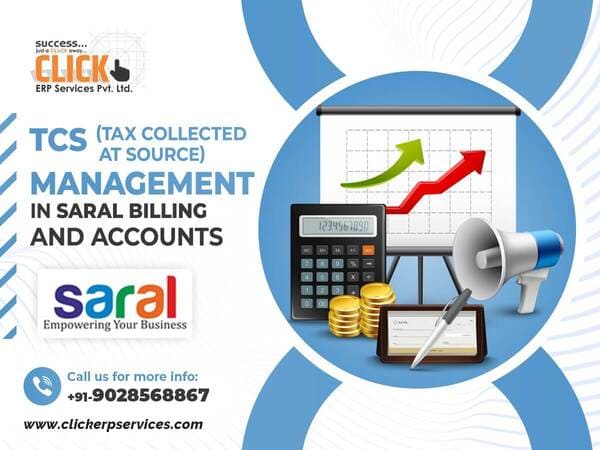- +91-90285 68867
- sales@clickerpservices.com



TCS (Tax Collection at Source) Management in Saral Billing & Accounts
In Saral Accounts, the complete process of TCS computation is automated. The TCS automation comes with a recreated TCS Tax master, which will be created by default the required TCS Section, Rate of Tax, applicable Threshold Limit, Effective Date of Tax rate and Statutory Ledger which are pre-mapped.
Tax Collected at Source (TCS)
Tax Collected at Sources also known as TCS is the tax collected by the seller from the buyer at the time of sale of goods. This is governed under section 206C of the Income Tax Act.
The Goods applicable under TCS are as listed below;
- Liquor of alcoholic nature, made for consumption by humans
- Timber wood under a forest leased
- Timber wood by any other mode than forest leased
- A forest produce other than Tendu leaves and timber
- Tendu leaves
- Scrap
- Minerals like lignite, coal and iron ore
- Bullion that exceeds over Rs. 2 lakhs/ Jewellery that exceeds over Rs. 5 lakh.
- Purchase of Motor vehicle exceeding Rs. 10 Lakhs
- Parking lot, Toll Plaza and Mining and Quarrying
To know more on the rate of tax applicable on sale of above goods, read below; https://www.saraltds.com/blogs/tcs-rate-chart/f
When the above-mentioned goods are purchased and utilized for the purpose of manufacturing, processing, or producing things, then the taxes are not payable. If the goods are u purchased and utilized for trading purposes then tax is payable. The tax payable is collected by the seller at the point of sale.
In Finance Bill 2020, recent changes have been brought on TCS applicability which can be read below; https://www.saralaccounts.com/blogs/change-in-tcs-provision-2020/
TCS Management in Saral Accounts
In Saral Accounts, the complete process of TCS computation is automated. The TCS automation comes with pre-created TCS Tax master, which will be create by default the required TCS Section, Rate of Tax, applicable Threshold Limit, Effective Date of Tax rate and Statutory Ledger which are pre-mapped.
On enabling TCS on required items and party ledgers, TCS will be auto calculated during the invoice generation as per the Threshold limit and Rate of TCS mentioned in Tax Master.
Benefits of TCS Management in Saral Accounts
- Complete process automation.
- Errors due to manual calculation and processing is reduced.
- The effective date for any new changes will be auto considered.
- Flexible to apply TCS for items and party ledgers.
- All types of views and reports are available for TCS computation
TCS Management Configuration, Utilization and Reports in Saral Billing and Accounts
Configuration:
- To enable the TCS process, go to Inventory >> Inventory Settings >> Features tab and click on Enable TCS. After enabling the option, save and exit.
- To create the required Ledgers
- Go to Tools >> Show/Hide, select Default Ledger and Save
- Next, go to Master >> Default Ledger >> TCS tab. Here, select required section statutory ledgers or click on Select All. Click on Create and the required ledgers will be created
- To enable TCS in Invoice, go to Inventory >> Transaction Formats and select the required format. Enable Post Billing for TCS and save the format setting.
- To make TCS applicable for an Item, go to Master >> Item, select/create an item. Click on the Tax Details tab and enable TCS. Select the applicable section from the list and save it.
- Lastly, to enable TCS for a Party/Customer, go to Master >> Ledger, select/create a customer ledger. Click on the Other Details tab and enable Apply TCS. Then, enable TCS From First Bill if the TCS has to be collected from Re. 1 of Invoice
Steps to create New TCS section with recent amendments
- Go to Tools >> Show/Hide, select Tax Master and Save.
- Next, go to Master >> Tax Master, select Tax Type as Tax Collected at Source. Click on the 3 doted (…) button next to Main Class to create the main class.
- In this window, enter the New TCS section name as the Main class, Tax type, Tax Rate applicable, Section Code, and Threshold limit Per Bill and Per Annum. After entering all the details, save, and exit.
- Now, select the created Main Class, and enter the Effective From and To date for the section.
- Next, select the Tax Ledger from the dropdown. The tax ledger can be edited or created by pressing F9. The tax ledger has to be created under the Statutory Dues group. Make sure to enable Tax Type and select Tax Collected at Source for Tax Type in the Tax Details tab. After editing/creating, save the ledger and exit.
- Now, save the Tax Master changes and exit.
Utilization:
- Go to Inventory >> click on Sales Invoice/Purchase Invoice. Here, enter the Date of the invoice, select the Customer/Supplier ledger and enter the item details with quantity and rate. If TCS is enabled for the selected item and party then TCS will be calculated automatically.
- Save and print the invoice.
Reports:
- Go to Inventory >> Views >> Transaction Register >> Sales Invoice/Purchase Invoice, select the required period. All the transactions for the selected period will be displayed.
- Click on Show Options >> enable TCS to view each item wise TCS amount.
- Also, you can go to Accounts >> Account Books >> Sales Day Book (Alt+7)/Purchase Day Book (Alt+8) >> select the required period.
- Select View type as Columnar View to view bill wise TCS amount column

